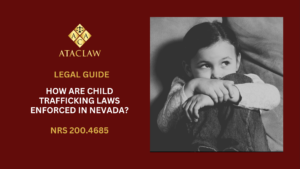Curious about the legal implications of child trafficking in Nevada? At ATAC LAW, we delve into NRS 200.4685, the statute governing this offense. Child trafficking involves the buying, selling, or permanently leaving a child with a non-relative, constituting a serious felony under Nevada law. Let’s explore the penalties, defenses, and more surrounding child trafficking in Nevada.

What Constitutes Child Trafficking in Nevada?
Child trafficking in Nevada encompasses various actions involving minors under 18 years old, including selling or purchasing a child, transferring a child for sale, or aiding in the abandonment of a child by a parent or guardian to a non-relative.
Notably, legally surrendering a child for adoption, foster care, or guardianship through proper legal channels does not constitute child trafficking. Nevada also has a Safe Haven law allowing parents to surrender infants less than 30 days old to designated Safe Haven providers, such as police stations, fire stations, hospitals, or emergency medical services, without facing child trafficking charges.
It’s essential to distinguish child trafficking from human trafficking, which involves the exploitation of undocumented individuals, and sex trafficking, which entails forcing individuals into prostitution.
What Are the Strongest Defenses Against Child Trafficking Charges in Nevada?
Navigating child trafficking charges in Nevada requires robust defense strategies to protect the accused. With the law only recently enacted in 2015 and lacking significant legal precedent, criminal defense attorneys have room for creative defense tactics. Let’s explore the most effective defenses against child trafficking charges and how they can be employed to safeguard individuals facing such allegations.
- Lack of Intent: Arguing that there was no intention to permanently abandon the child can be a potent defense. Valid reasons for temporarily leaving a child with another person include employment, vacation, incarceration, military deployment, or incapacitation due to hospitalization.
- False Accusations: False allegations, often stemming from contentious custody disputes, are another potential defense. Co-parents may levy untrue claims against each other, while children, fueled by anger or misunderstanding, might make false accusations without comprehending the consequences.
In any criminal case, the burden rests on the prosecution to prove guilt beyond a reasonable doubt—a demanding standard. If the defense can demonstrate that the state’s evidence is insufficient or problematic, the criminal charges may not withstand scrutiny. With skillful legal representation, individuals facing child trafficking charges can navigate the legal process effectively and seek the best possible outcome for their case.
What Are the Penalties for Child Trafficking According to NRS 200.4685?
Penalties for Child Trafficking:
- Prison Sentence: Child trafficking in Nevada is classified as a category C felony, carrying a potential prison term of 1 to 5 years upon conviction.
- Monetary Fines: In addition to imprisonment, individuals convicted of child trafficking may face fines of up to $10,000, as determined by the court.
Restitution Orders:
- Additional Financial Obligations: If deemed appropriate, the court may order the convicted individual to pay restitution for various expenses related to the trafficking victims, including:
- Medical and psychological treatments.
- Child care expenses, encompassing housing and transportation costs.
- Property damage restitution.
- Reimbursement for expenses incurred by law enforcement during the case.
- Repatriation costs for victims returning to their home country.
Are There Immigration Consequences for Child Trafficking Charges?
Child trafficking charges in Nevada can have significant immigration implications, potentially leading to deportation for non-citizens convicted of this offense. Given the serious consequences involved, individuals who are not U.S. citizens and are facing child trafficking charges should seek legal counsel promptly. Competent legal representation can help navigate the complexities of the legal system, aiming to have the charges dropped or reduced to non-deportable offenses, thereby safeguarding immigration status and minimizing the risk of deportation.
Is Sealing My Criminal Record Possible After Child Trafficking Charges?
Nevada’s laws regarding the sealing of criminal records, particularly for offenses like child trafficking, are complex and somewhat ambiguous. While category C convictions are typically sealable five years after the case concludes, certain “crimes against children,” such as kidnapping, are explicitly prohibited from being sealed.
Given the similarity between child trafficking and kidnapping, prosecutors may argue that child trafficking falls under the category of unsealable offenses. However, individuals whose criminal charges are dismissed may still have the opportunity to petition for a record seal without delay. Seeking guidance from a knowledgeable legal professional can provide clarity on the available options and potential pathways to sealing a criminal record.
For further legal assistance and to discuss your case with an expert, don’t hesitate to contact ATAC LAW.
